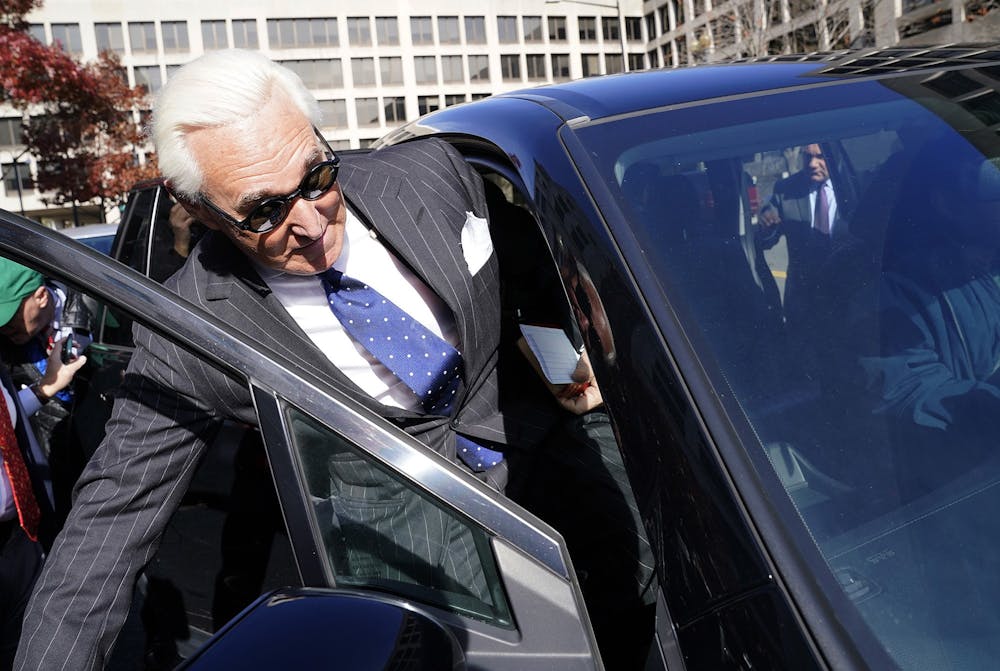Hours after President Donald Trump tweeted about the “very unfair” conviction issued to his longtime associate Roger Stone, senior officials at the Department of Justice overruled the sentence recommended by their attorneys, prompting all four career prosecutors to abruptly withdraw from the case.
Wednesday, Sen. Sherrod Brown, D-OH, vocalized his concerns about the integrity of this decision and expressed frustration with the Senate’s unwillingness to hold Trump accountable.
“He can do whatever he wants, whenever he wants,” Brown said. “He can abuse his office. He'll never ever be held accountable by this Senate.”
While Trump’s move has attracted criticism from several Republican senators, nothing has been done to prevent this flagrant abuse of presidential influence. Considering the miraculous devotion he inspires among his base and the strict loyalty he demands of the undevoted, it is no surprise that federal prosecutors who must be indifferent to partisan loyalty decided to quit under the pressure of Trump’s partisan agenda.
It appears that Trump can do no wrong in the eyes of his Republican minions and will continue to elude justice for his litany of crimes.
It’s not like the GOP can go back to normal after Trump is gone. Like axle grease on fine linen, he will leave an irrevocable stain on the Republican Party through his all-or-nothing politicking which has enveloped our political sphere in chaos.
But Trump relishes the chaos, and Republicans who don’t get in line get pushed into line. Trump singled out Sen. Mitt Romney, R-UT, the only Republican who crossed party lines in last week’s impeachment trial to vote “guilty” on abuse of power, in a tirade of celebratory post-acquittal tweets.
Likewise, Trump punished Alexander Vindman and Gordon Sondland, two key witnesses in the impeachment hearings, by firing them just 48 hours after acquittal.
Impeachment was a watershed moment of Trump’s whirlwind presidency, and I believe it has crystallized a pernicious ultra-partisanship that will pervade politics for decades to come. Our generation could be living with Trump for the rest of our ripe political years.
While Trump’s omnipresence in American politics seems almost natural after three years of desensitization, the situation was not always so bleak.
Recall the “Never Trump” movement, a massive coalition of conservatives who opposed the presidential nomination of Trump in 2016. A myriad of prominent conservatives, including eight sitting Republican senators and twelve sitting Republican representatives, supported this movement.
Clearly those same Republicans, such as Sen. Lindsey Graham, R-SC, hurled all political and moral reservations out the window after realizing Trump’s base was committed to him regardless of his conduct. For example, the video of Trump’s “locker-room talk” in which he alludes to how he might leverage his power to sexually assault women was swept under the metaphorical rug of Republicans’ memory after he was elected. Realizing that even this disgusting show of immorality couldn’t dissuade his core constituents was probably a political sigh of relief for most congressional Republicans.
Now, the same Republicans who claimed they would “never” support Trump’s presidency gleefully submit to his criminal activities. Despite the wealth of evidence against him and the growing number of senators who are admitting that Trump’s conduct was inappropriate for a sitting President, he was acquitted.
Partisanship in a two-party system is not inherently evil. In fact, it’s natural and probably healthy within reason. But party alignment becomes a dangerous obsession instead of a simple phenomenon when it is esteemed as the final consideration in all political matters.
How should the Democratic Party respond to this vexing show of partisan loyalty? Many believe the answer is more party unity, which is tantamount to stricter partisanship. From a standpoint of survival, I don’t blame the Democrats for believing in this prescription, though it should be stated that this answer will perpetuate partisan gridlock.
Even before the Trump era, we labored under the sweltering and oppressive humidity of our political climate. Now, it seems as if we are condemned to suffer from the partisanship native to this era of the American political jungle. If our generation wasn’t already suffocating on partisanship, it will be attempting to perform the Heimlich on a choking political system for decades to come.
Carter Cooley (he/him) is a junior studying political science. After graduating he plans to go into political campaign management.






